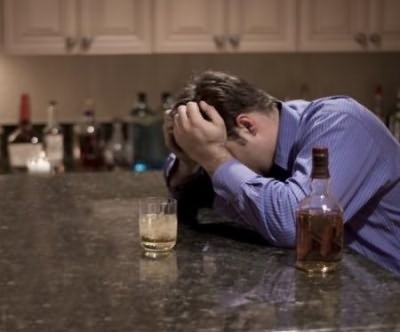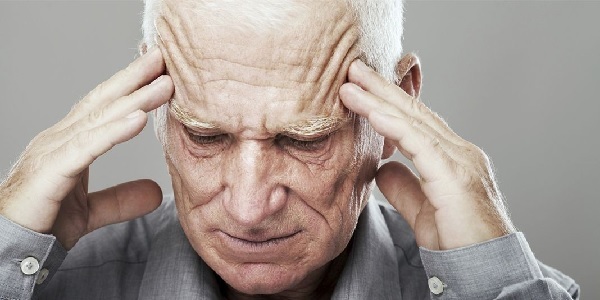Alcoholic psychosis: from transient hallucinations and anxiety to death
Contents:
- Assumptions
- Alcoholic psychosis
- Atypical forms of delirium
- Acute alcoholic encephalopathies
- Compulsive desire for alcohol
- Convulsive states
- Treatment
- Side effects
 Alcoholic psychosis develops in the 2-3 stages of alcoholism. At the beginning of the formation of dependence, it does not occur. For psychosis is required alcohol intoxication, formed during a certain time of alcohol abuse and led to the development of toxic changes in internal organs and metabolism in the body in general.
Alcoholic psychosis develops in the 2-3 stages of alcoholism. At the beginning of the formation of dependence, it does not occur. For psychosis is required alcohol intoxication, formed during a certain time of alcohol abuse and led to the development of toxic changes in internal organs and metabolism in the body in general.
Important! Alcoholic psychosis develops after 5-10 years of drinking alcohol. Unfortunately, today there is a "rejuvenation" of this pathology. If earlier it was manifested in 40-50 years, now, what is alcoholic psychosis, they know about themselves in 20-30 years. And not after 5-10 years of alcohol abuse, but before.
So, alcoholic psychosis, what is it and how is it manifested? Manifestations of psychosis are variable. It depends on the "length of service" of abuse that the patient has, his individual characteristics. There are different forms of the course of psychosis on the basis of alcoholism:
- predileases;
- alcoholic delirium;
- hallucinations.
Forms of psychosis do not always exist separately. Often there is a transition from one to another.
Assumption
Alcoholic psychosis begins, usually 2-3 days after the patient has consumed alcohol. In this case, the patient has abstinence symptoms( hangover).The totality of these symptoms is a predileious condition. Some at this stage suffer from convulsive seizures. There are other harbingers of the white fever:
- nervousness;
- poor sleep;
- awakening in severe, anxious state;
- a constant negative mood against a background of constant anxiety and anxiety;
- tremor;
- motor excitement.
The patient is in a constant state of anxiety. He does not sit still, constantly makes some movements. There is a tremor of the hands, and to a lesser extent the entire body. The tremor increases. The attack begins more often at night. Against the backdrop of a clear consciousness, there are deceptions of feelings. Alcoholic psychosis
Alcoholic delirium( white fever).This variant is diagnosed more often than others. In this case, there is motor excitement, various kinds of hallucinations, vivid illusions, disruption of orientation in time, space, sometimes self. Characteristic combination of fear with humor, severe anxiety, limb trembling, sleep disturbances, increased sweating, increased heart rate.
Important! The first attack in the patient develops after he drank heavily in large quantities. An additional, provoking factor is stress, significant physical or emotional exhaustion, a serious illness.
The following psychoses occur after a short drunkenness. On anxiety superimposed vivid memories are added, later visual hallucinations are added. Patients lose the correct orientation in their place of stay and in the current time. However, the orientation in his personality persists. The patient becomes even more active, his movements and facial expressions are animated.
The mood changes sharply from good-natured to negative, aggressive and vice versa. The dream finally disappears. Gradually there are true hallucinations. Priority in them have bright microzoanglacination. The patient sees spiders, insects, snakes and various monsters similar to them. Hallucinations can pass into one another, and can be an entire representation with a "plot".
In the future, the spectrum of hallucinations is expanding. Hallucinations with non-existent voices, smells, sensation of touch, temperature changes join. They can be localized in the mouth area. It seems to the patient that in the mouth of the thread, other objects that need to be pulled out, spit out. Often, the sensation of your body or its parts in space is disturbed.
Patients tend to perform some kind of action, inspired by hallucinations: to escape, hide, shake. They talk to the imaginary present, argue. All the emotions are bright, quickly replacing each other: complacency, anger, surprise, despair, humor. Fear in this case remains almost constant companion. Sometimes hallucinations can disappear for a while. These are the so-called lucid gaps.
Important! Delirium can sometimes completely stop on its own, without treatment for 2-5 days. Less than a week are delayed.
After leaving this state, people remember individual episodes, hallucinations, but can not remember their behavior and everything that happened around them. To mental changes in delirium, disorders of internal organs join: exacerbation of chronic pathologies of the organism, cardiovascular complications, exacerbation or development of GIT diseases are possible.
Atypical forms of delirium
Much less common are atypical forms of alcoholic delirium. These include several forms:
- The anodic form of obsolescence of consciousness .This psychopathological syndrome is characterized by special disorders of consciousness. Hallucinations and dream experiences are fantastic pictures with a network of events, in part intertwined with real life. In this case, there is a transformation of one's own self, the transformation of the patient into an animal, a bird, a plant in his consciousness.
- Syndrome of mental automatism. Characteristic features for him are feelings of alienation of his own "I".This is expressed in a person's confidence that his thoughts become known to others, are abducted by them, that his actions and emotions are guided from the outside. Such people say that they "laugh", "solve them", "make them", are sure that all movements and emotions are caused by violent means. Often, transitivity joins( the belief that others are also under the influence of the same forces).
- Mutating ( muttering) delirium .This form is particularly severe. It is transformed into alcoholic encephalopathy, it can end lethal. It begins like the usual. But gradually amenable symptoms( confusion, incoherence of actions and speech, apathy to everything) are gradually added. Patients do not go on verbal contact, do not show any reaction to others. Movement only the most necessary. From bed practically do not rise because of their unwillingness. Lying in bed, they pick the folds of the underwear, possible hyperkinesis( involuntary sharp movements).Speech is practically absent. Such patients publish sounds that are not very similar to articulate speech, they mutter. From somatic abnormalities for them is characterized by an increase in body temperature, a decrease in blood pressure, a general dehydration of the body. If a patient leaves this state of psychosis, the entire period of the illness is usually forgotten.
- Abortive delirium .It lasts a short time. Recovery, as a rule, independent. There are hallucinations, but there are no serious disorders of consciousness. This delirium can be called a favorable option.
Unfortunately, today the number of atypical, mixed forms of delirium has increased, which lead to the formation of anemia-like conditions, coma with poor prognosis.
Important! The syndrome of acute alcoholic hallucinosis is the second most frequent occurrence. In this case, hallucinations and psychiatric disorders prevail with a predominance of severe anxiety.
Acute alcoholic encephalopathies
At the same time there is a combination of mental changes, disorders of the work of various internal organs, neurological pathologies. Abstinence in the formation of encephalopathy, as a rule, pronounced. In the past, these patients had seizures, previously suffered delirium. Patients may complain of intense pain in the projection of the heart, choking, fever, excessive sweating.
What is alcoholic psychosis or alcoholic encephalopathy of Gaye-Wernicke? This is a severe form of psychosis. It begins with a serious delirium. Then a violation of consciousness, neurological changes: a fixed look, a grasping reflex, doubling in the eyes, omission of the eyelid, disturbance of the motor activity is quickly joined. Such patients look exhausted, much older than their age.
Over time, blood pressure tends to decrease, down to hypotonic shock. Patients suffer from high fever. Dehydration is increasing.
Compulsive attraction to alcohol
Often during treatment, there is an increased desire to consume alcohol. This need can be very strong, up to a state of affect, a disturbance of consciousness. This attraction is also considered acute and requires indispensable treatment. It is dangerous because there is a great danger of renewal of alcohol consumption. Therapy of such patients consists in easing attraction. To do this, use drugs tranquilizers, neuroleptics.
Convulsive states
Convulsive syndrome is more characteristic for the time of a hangover state( abstinence).However, it can also occur at other stages. More common in those patients who in the past suffered craniocerebral trauma, neurological diseases. Anticonvulsant therapy comes first.
Treatment of
 For any psychosis, therapy should be comprehensive and as complete as possible. If alcoholic psychosis develops, treatment at home in full is impossible. In addition, we can not exclude the rapid transition of a lighter form of psychosis into a severe one. An integrated approach to treatment includes:
For any psychosis, therapy should be comprehensive and as complete as possible. If alcoholic psychosis develops, treatment at home in full is impossible. In addition, we can not exclude the rapid transition of a lighter form of psychosis into a severe one. An integrated approach to treatment includes:
- Detoxification therapy, the purpose of which is the elimination of toxic metabolites of alcohol. It is proved that metabolites are the leading culprits of intoxication and the formation of delirium.
- Leveling of psychomotor agitation. Soothing therapy. To do this, prescribed sleeping pills, tranquilizers.
- Maintaining vital functions.
- Correction of metabolism, as far as possible.
- Correction of the volume of fluid in the body and the level of electrolytes.
- In severe conditions, manifestations of multiple organ failure, treatment is performed in the intensive care unit. If necessary, translation into mechanical ventilation is possible.
Side effects of
Unfortunately, in some cases, the treatment of psychosis can have side effects:
- neuroleptic syndrome;
- development of resistance to therapy after long-term treatment, as well as repeated.
Thus, if there is an alcoholic psychosis, the consequences of it can be extremely sad. It depends on how long and a lot of people abused alcohol, the presence of concomitant pathologies of the brain and internal organs in general, the timeliness of treatment, individual characteristics.
write the question in the form below:



